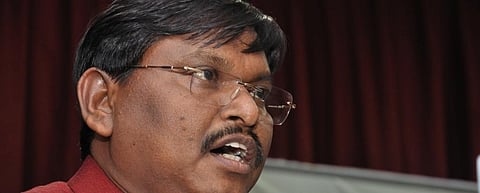

Livelihood options for tribal communities through the Pradhan Mantri Van Dhan Yojana (PMVDY) should be ensured by states during the 21-day national lockdown to curb the spread of the novel coronavirus disease (COVID-19), said Union Minister of Tribal Affairs Arjun Munda.
PMVDY was launched on April 14, 2018 by the Ministry of Tribal Affairs and the Tribal Cooperative Marketing Development Federation of India (TRIFED), a government body responsible for courting market linkages for MFPs.
The scheme was launched with the aim to create additional income for tribal communities through value addition.
The peak season for collecting and harvesting minor forest produce (MFP) had arrived in many regions, Munda wrote in a letter to the chief ministers of 15 states on April 6, 2020.
MFPs are all non-timber forest produce of plant origin, including bamboo, canes, gums and waxes as well as many forms of food including nuts and honey, according to TRIFED.
It was “imperative to initiate certain proactive measures to ensure the well-being of the tribal communities and their economy based on MFPs and NTFPs by providing them safety and ensuring their livelihoods,” he wrote in the letter.
The minister’s letter came after TRIFED shared with all the states on April 3, a list of dos and don’ts — including social distancing and using hand sanitisers — while collecting MFPs.
Munda wrote separate letters to the chief ministers of Andhra Pradesh, Assam, Chhattisgarh, Gujarat, Jharkhand, Karnataka, Kerala, Madhya Pradesh, Maharashtra, Manipur, Nagaland, Odisha, Rajasthan, Uttar Pradesh and West Bengal.
Approximately 1,205 Van Dhan Vikas Kendras (VDVKs) in 27 states and a union territory were sanctioned under the PMVDY scheme, for undertaking value addition.
Munda urged the chief ministers to ensure the collection of MFPs by their respective states and eliminating the movement of middlemen from urban to tribal areas.
“Funds to the tune of Rs 33.33 crore are available with your state under the said scheme and additional funds, if any required, shall be made available by the ministry,” he wrote in the letter given to Bhupesh Baghel, the chief minister of Chhattisgarh.
Market forces would try to exploit tribal gatherers by pushing them for the distress sale of NTFP, Munda said in the letter.
“MFP scheme will need to be implemented with extra energy, especially in the most vulnerable areas,” he wrote.
VDVKs, however, were only found in selected pockets and were primarily focused on capacity building, according to Y Giri Rao, a member of Vasundhara, a Bhubaneswar-based non-profit working for tribal issues.
“They will have to be scaled substantially to meet this challenge,” he said.
Most of the states were yet to accelerate the setting up of 6,000 VDVKs, despite fund allocation being done, said Chitta Ranjan Pani, an Odisha-based researcher, working on tribal issues related to MFPs.
“There is need of proper collaboration and commitment both from the central and state governments for benefits to reach forest produce gatherers,” he said.
Pani also said that 50 MFPs were included in the minimum support price under the PMVDY scheme in early 2019, but the parameter of fair average quality (FAQ) was issued for only 23 MFPs.
The FAQ parameters are norms of quality that the state agency has to ensure while procuring MFPs.